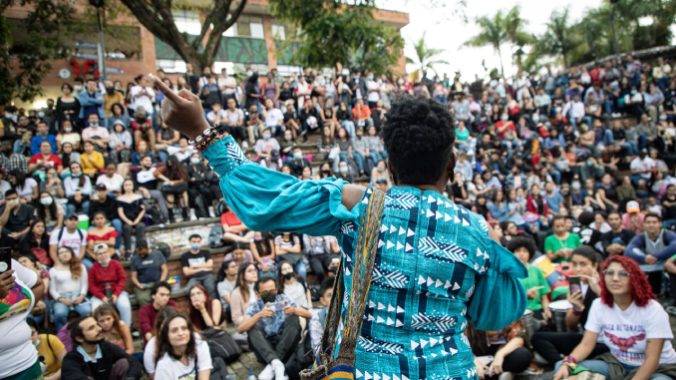Colombian Election Doc Igualada Is Surprisingly Anonymous

A trap that some documentaries fall into is thinking that superlative access to a subject—a rock star, a murderer, a politician—is enough to make it into a compelling, worthwhile movie. But, ironically, proximity only gets us so close. We may be rubbing shoulders with Francia Márquez, the politician who is now (spoilers!) Vice President of Colombia, during Juan Mejía Botero’s Igualada, but its design as an underdog campaign narrative lacks the detail, context and pacing to be more than a loose promotional video for its subject.
To be sure, Márquez is an impressive figure to follow. A Black Colombian with decades of experience protesting mining companies trying to pillage her rural community of La Toma (and the paramilitary groups serving as their enforcers), she’s an imposing, tough, principled leader. She’s stared down death threats—surviving one assassination attempt, which injured two of her bodyguards—and the dark coalition of Colombian politicians, organized right-wing thugs and international corporations behind them. The most evocative, staggering image Botero captures in his doc is Márquez, delivering a campaign speech, slowly and unceremoniously being blocked from view by a pair of riot shields. Márquez has also faced discrimination, and made it part of her political identity; “igualada,” a derogatory term leveled at those uppity lesser-thans who dare ask for equality, becomes a reclaimed battle cry.
So it is all the more disappointing that Botero’s access does not result in intimacy or understanding. These biographical details are spread out in cutaways to archival footage from Márquez’s early days as an activist, the timeline leaping with such abandon that every other sequence is reoriented by on-screen paragraphs. Even with these explanations, the order can get unclear, with historical context and narrative progression fighting for dominance, and the jumps back and forth can seem arbitrary. Just as it’s impressive that Botero was along for the ride in the very early stages in Márquez’s run for President, it’s impressive that there’s such a treasure trove of footage from her early career. But its deployment is all over the place, simultaneously sapping the campaign side of things whenever it picks up steam and getting its legs cut out from under it whenever we start learning too much about rural Colombia’s dire history of military-economic exploitation.
The combination of top- and ground-level documentation gives the worst of both worlds. As soon as we’re prepared to watch how—in the grand tradition of recent election movies like Knock Down the House—Márquez snatches victory from the jaws of defeat and snatches grassroots popularity from the doldrums of anonymity, her meteoric rise becomes a watered-down montage.
-

-

-

-

-

-

-

-

-

-

-

-

-

-

-

-

-

-

-

-

-

-

-

-

-

-

-

-

-

-

-

-

-

-

-

-

-

-

-

-








































